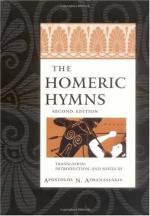So the livelong day in oneness of heart did they cheer each other with love, and their minds ceased from sorrow, and great gladness did either win from other. Then came to them Hekate of the fair wimple, and often did she kiss the holy daughter of Demeter, and from that day was her queenly comrade and handmaiden; but to them for a messenger did far-seeing Zeus of the loud thunder-peal send fair-tressed Rhea to bring dark-mantled Demeter among the Gods, with pledge of what honour she might choose among the Immortals. He vowed that her daughter, for the third part of the revolving year, should dwell beneath the murky gloom, but for the other two parts she should abide with her mother and the other gods.
Thus he spake, and the Goddess disobeyed not the commands of Zeus. Swiftly she sped down from the peaks of Olympus, and came to fertile Rarion; fertile of old, but now no longer fruitful; for fallow and leafless it lay, and hidden was the white barley grain by the device of fair-ankled Demeter. None the less with the growing of the Spring the land was to teem with tall ears of corn, and the rich furrows were to be heavy with corn, and the corn to be bound in sheaves. There first did she land from the unharvested ether, and gladly the Goddesses looked on each other, and rejoiced in heart, and thus first did Rhea of the fair wimple speak to Demeter:
“Hither, child; for he calleth thee, far-seeing Zeus, the lord of the deep thunder, to come among the Gods, and has promised thee such honours as thou wilt, and hath decreed that thy child, for the third of the rolling year, shall dwell beneath the murky gloom, but the other two parts with her mother and the rest of the Immortals. So doth he promise that it shall be and thereto nods his head; but come, my child, obey, and be not too unrelenting against the Son of Cronos, the lord of the dark cloud. And anon do thou increase the grain that bringeth life to men.”




